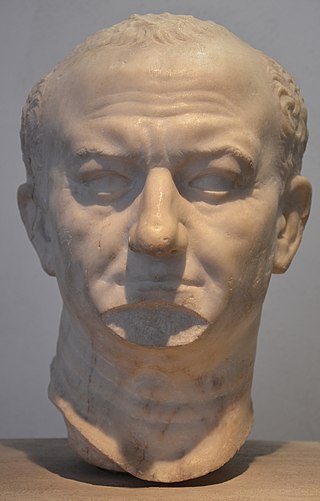Related Research Articles
The 280's decade ran from January 1, 280, to December 31, 289.

Flavius Valerius Constantius "Chlorus", also called Constantius I, was Roman emperor from 305 to 306. He was one of the four original members of the Tetrarchy established by Diocletian, first serving as caesar from 293 to 305 and then ruling as augustus until his death. Constantius was also father of Constantine the Great, the first Christian emperor of Rome. The nickname Chlorus was first popularized by Byzantine-era historians and not used during the emperor's lifetime.

Flavia Maximiana Theodora was a Roman empress, wife of Constantius Chlorus.

The gens Flavia was a plebeian family at ancient Rome. Its members are first mentioned during the last three centuries of the Republic. The first of the Flavii to achieve prominence was Marcus Flavius, tribune of the plebs in 327 and 323 BC; however, no Flavius attained the consulship until Gaius Flavius Fimbria in 104 BC. The gens became illustrious during the first century AD, when the family of the Flavii Sabini claimed the imperial dignity.
Anicius Faustus was a Roman senator who was appointed consul in AD 298.
Gaius Ceionius Rufius Volusianus was a Roman senator who had a lengthy political career and who was appointed consul at least twice, the known dates being AD 311 and 314.
Lucius Petronius Taurus Volusianus was a Roman citizen, apparently of equestrian origins, whose career in the Imperial Service in the mid-Third Century AD carried him from a relatively modest station in life to the highest public offices and senatorial status in a very few years. He may have secured his first appointments before the Licinian Dynasty – – acceded to the Empire in 253 AD, but it was in the course of their reign that his upward progress achieved an almost unprecedented momentum and the second factor seems to have been a consequence of the first. The nature of his relationship to the Licinii is uncertain, but it seems likely that a common origin in the Etruscan region of central Italy at least predisposed Gallienus in his favour and he seems to have been that emperor's most trusted servant and adviser during the period of his sole reign - 260(?)-268 AD.
Lucius Caesonius Ovinius Manlius Rufinianus Bassus was a Roman military officer and senator who was appointed suffect consul twice, in around AD 260 and 284.
Valerius Maximus was a Roman senator.
Aurelius Hermogenianus, or Hermogenian, was an eminent Roman jurist and public servant of the age of Diocletian and his fellow tetrarchs.
Virius Lupus was a consul of the Roman Empire in 278.
Clearchus was a Roman politician who was consul of the Roman Empire in 384 AD.
Aristaenetus was a Roman politician who was appointed consul in AD 404 alongside the western emperor Honorius.
Claudius Antonius was a Roman politician under the reigns of Valentinian I, Gratian and Theodosius I. He was appointed consul in AD 382 alongside Afranius Syagrius.
Flavius Arintheus was a Roman army officer who started his career as a middle-ranking officer and rose to senior political and military positions. He served the emperors Constantius II, Julian, Jovian and Valens. He was appointed consul in 372 alongside Domitius Modestus.
Flavius Eusebius was a Roman military officer and politician, and is usually identified as the posthumous father-in-law of the Roman emperor Constantius II.
Flavius Hypatius was a Roman Senator, who was the brother-in-law of the Roman emperor Constantius II.
Ulpius Limenius was a Roman politician who was appointed consul in AD 349.
Gaius Annius Anullinus was a Roman senator who was appointed consul in AD 295.
Pomponius Januarianus was an aristocrat who held a number of imperial appointments, most notably consul in AD 288.